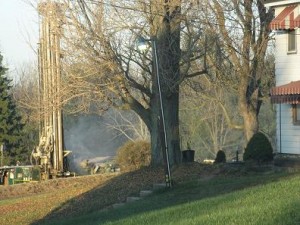The referenced media source is missing and needs to be re-embedded.
Fracking operations near a home in Armstrong County, PA
In a December 2 commentary in the
Boston Globe, columnist Tom Keane wrote that "The key to American energy independence is ‘drill, baby, drill’ -- or perhaps more correctly, 'frack, baby, frack.'"
Fracking, formally known as hydraulic fracturing, is a process in which millions of gallons of water, spiked with known and proprietary additives, are forced into shale stone at very high pressures, typically 10,000 pounds per square inch, to fracture the stone and release oil and natural gas.
Keane may not fully appreciate the environmental cost of fracking; it consumes large amounts of water and releases contaminated water underground. In an age when many cities, towns and individuals throughout America already struggle to maintain adequate water supplies for drinking and irrigation, it makes no sense at all to consume vast quantities of water. The fact that the fracking process pollutes the water only adds insult to injury.
Keane should learn from Sandra Postel, who is founder and director of the Global Water Policy Project and one of the world's most respected authorities on freshwater issues. She recommends that we bring hydraulic fracturing under the purview of the Clean Water Act (as well as the Safe Drinking Water Act) and establish permitting requirements that safeguard surface and ground waters from contamination.
Interestingly, on the heels of Keane’s commentary came another Boston Globe article on
December 13, which reported that western Massachusetts contains some small shale oil gas deposits and therefore could see small-scale gas development in several years, according to
American Ground Water Trust executive director Andrew Stone. (American Ground Water Trust is a New Hampshire based organization that includes representatives from engineering and chemical companies on its board.)
We need to pay close attention to this issue, because fracking may undermine much of the water conservation progress that we have fought for over the past 50 years. If that's the price we have to pay in exchange for energy independence, it's no bargain at all -- for the economy or the environment.
_________________
The referenced media source is missing and needs to be re-embedded.
Marion Stoddart
Groton, MA
Marion Stoddart is a citizen leader committed to a lifetime of grassroots organizing and coalition building for positive social and environmental change. she was one of the founders of the Nashua River Watershed Association in 1969 and her story is captured in the documentary Work of 1000. To learn more about hydraulic fracturing, check out CWA's page "Fighting Fracking."


